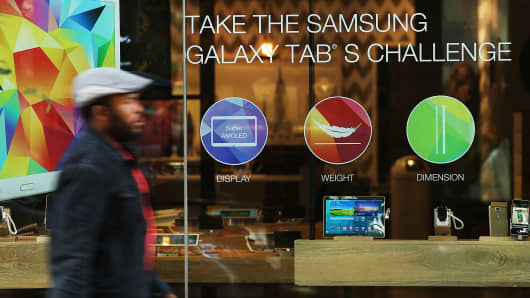Samsung Electronics'
acquisition of U.S. startup LoopPay may see it dominate the mobile
payment space, experts say, upping the rivalry with long-standing
competitor and current market leader Apple.
The South Korean giant announced the deal on Wednesday but exact terms have yet to be disclosed. Details of Samsung's partnership with Massachusetts-based LoopPay first emerged in December following reports that the tech giant was in talks to develop a product to rival Apple Pay.
Samsung may be late to the mobile payment game, with
Apple Pay operating since September, but LoopPay has one major difference: Unlike Apple Pay and Google Wallet, which rely on near-field communications (NFC), LoopPay says it is compatible with existing magnetic-stripe card readers, which form the majority of existing point-of-sale (POS) terminals, and doesn't require any additional infrastructure.
LoopPay also works alongside NFC technology, the company said, making it more flexible than its peers.
Read MoreUncle Sam to accept Apple Pay
"This acquisition gives Samsung an edge against a near field communication (NFC) based wallet, such as Apple Pay, because Samsung does not have to convince retailers to upgrade their terminals to support NFC payments as Apple has had to do with its current NFC-only strategy," said Michelle Evans, senior consumer finance analyst, at Euromonitor, in a note.
"If Samsung plans to win this mobile payments war, its future mobile wallet will be able to run off of both of these technologies [magnetic-stripe and NFC] until NFC-enabled payment terminals are widespread across all merchant types," she added.
The convenience of LoopPay should see it gain widespread acceptance among merchants, which is essential to winning the mobile payments market.
The South Korean giant announced the deal on Wednesday but exact terms have yet to be disclosed. Details of Samsung's partnership with Massachusetts-based LoopPay first emerged in December following reports that the tech giant was in talks to develop a product to rival Apple Pay.
Samsung may be late to the mobile payment game, with
Apple Pay operating since September, but LoopPay has one major difference: Unlike Apple Pay and Google Wallet, which rely on near-field communications (NFC), LoopPay says it is compatible with existing magnetic-stripe card readers, which form the majority of existing point-of-sale (POS) terminals, and doesn't require any additional infrastructure.
LoopPay also works alongside NFC technology, the company said, making it more flexible than its peers.
Read MoreUncle Sam to accept Apple Pay
"This acquisition gives Samsung an edge against a near field communication (NFC) based wallet, such as Apple Pay, because Samsung does not have to convince retailers to upgrade their terminals to support NFC payments as Apple has had to do with its current NFC-only strategy," said Michelle Evans, senior consumer finance analyst, at Euromonitor, in a note.
"If Samsung plans to win this mobile payments war, its future mobile wallet will be able to run off of both of these technologies [magnetic-stripe and NFC] until NFC-enabled payment terminals are widespread across all merchant types," she added.
The convenience of LoopPay should see it gain widespread acceptance among merchants, which is essential to winning the mobile payments market.
"If you can't solve the problem of merchant acceptance...,
of being able to use the vast majority of your cards, then it can't
really be your wallet," said David Eun, head of Samsung's Global
Innovation Center, in a statement this week.
The acquisition is definitely a great move for Samsung's strategy, said Neil Shah, research director of devices and ecosystems at Counterpoint Research.
"If it can become more of a services and software player like Microsoft, and keep investing in areas other than hardware, Samsung can truly become a billion dollar entity," Shah said.
Read MoreSamsung keeps the faith in wearable tech
The outlook isn't entirely rosy however. The U.S. will be the only major region where Samsung can extend this advantage in mobile payments, warned Shah, since Europe doesn't employ magnetic stripe technology and mobile payment growth in emerging markets is still slow.
The acquisition is definitely a great move for Samsung's strategy, said Neil Shah, research director of devices and ecosystems at Counterpoint Research.
"If it can become more of a services and software player like Microsoft, and keep investing in areas other than hardware, Samsung can truly become a billion dollar entity," Shah said.
Read MoreSamsung keeps the faith in wearable tech
The outlook isn't entirely rosy however. The U.S. will be the only major region where Samsung can extend this advantage in mobile payments, warned Shah, since Europe doesn't employ magnetic stripe technology and mobile payment growth in emerging markets is still slow.
The mobile commerce war
Global mobile payments via tablets and mobile phones are
estimated to hit $721 billion by 2017, according to Gartner Research,
making the market understandably attractive for technology firms.
However, on-the-ground studies suggest that consumers have been slow to the uptake. A survey by Wakefield Research late last year discovered that 50 percent of American consumers were unfamiliar with mobile payments, such as Apple Pay or Google Wallet.
So, how will Samsung manage to make inroads?
"The fact that Samsung is looking to leverage the existing technology that is found in many merchant terminals today rather than requiring some sort of an upgrade is a big plus for the future of Samsung's future mobile wallet," Euromonitor said.
However, on-the-ground studies suggest that consumers have been slow to the uptake. A survey by Wakefield Research late last year discovered that 50 percent of American consumers were unfamiliar with mobile payments, such as Apple Pay or Google Wallet.
So, how will Samsung manage to make inroads?
"The fact that Samsung is looking to leverage the existing technology that is found in many merchant terminals today rather than requiring some sort of an upgrade is a big plus for the future of Samsung's future mobile wallet," Euromonitor said.


No comments:
Post a Comment